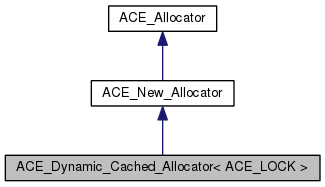|
ACE
6.1.0
|
|
ACE
6.1.0
|
A size-based allocator that caches blocks for quicker access. More...
#include <Malloc_T.h>


Public Member Functions | |
| ACE_Dynamic_Cached_Allocator (size_t n_chunks, size_t chunk_size) | |
| ~ACE_Dynamic_Cached_Allocator (void) | |
| Clear things up. | |
| void * | malloc (size_t nbytes=0) |
| virtual void * | calloc (size_t nbytes, char initial_value= '\0') |
| virtual void * | calloc (size_t n_elem, size_t elem_size, char initial_value= '\0') |
| void | free (void *) |
| Return a chunk of memory back to free list cache. | |
| size_t | pool_depth (void) |
| Return the number of chunks available in the cache. | |
Private Attributes | |
| char * | pool_ |
| ACE_Locked_Free_List < ACE_Cached_Mem_Pool_Node < char >, ACE_LOCK > | free_list_ |
| size_t | chunk_size_ |
| Remember the size of our chunks. | |
A size-based allocator that caches blocks for quicker access.
This class enables caching of dynamically allocated, fixed-size chunks. Notice that the chunk_size must be greater than or equal to sizeof (void*) for this to work properly.
This class can be configured flexibly with different types of ACE_LOCK strategies that support the ACE_Thread_Mutex and ACE_Process_Mutex constructor API.
| ACE_Dynamic_Cached_Allocator< ACE_LOCK >::ACE_Dynamic_Cached_Allocator | ( | size_t | n_chunks, |
| size_t | chunk_size | ||
| ) |
Create a cached memory pool with n_chunks chunks each with chunk_size size.
| ACE_Dynamic_Cached_Allocator< ACE_LOCK >::~ACE_Dynamic_Cached_Allocator | ( | void | ) |
Clear things up.
| void * ACE_Dynamic_Cached_Allocator< ACE_LOCK >::calloc | ( | size_t | nbytes, |
| char | initial_value = '\0' |
||
| ) | [virtual] |
Get a chunk of memory from free list cache, giving them initial_value. Note that nbytes is only checked to make sure that it's less or equal to chunk_size, and is otherwise ignored since calloc() always returns a pointer to an item of chunk_size.
Reimplemented from ACE_New_Allocator.
| void * ACE_Dynamic_Cached_Allocator< ACE_LOCK >::calloc | ( | size_t | n_elem, |
| size_t | elem_size, | ||
| char | initial_value = '\0' |
||
| ) | [virtual] |
This method is a no-op and just returns 0 since the free list only works with fixed sized entities.
Reimplemented from ACE_New_Allocator.
| void ACE_Dynamic_Cached_Allocator< ACE_LOCK >::free | ( | void * | ptr | ) | [virtual] |
Return a chunk of memory back to free list cache.
Reimplemented from ACE_New_Allocator.
| void * ACE_Dynamic_Cached_Allocator< ACE_LOCK >::malloc | ( | size_t | nbytes = 0 | ) | [virtual] |
Get a chunk of memory from free list cache. Note that nbytes is only checked to make sure that it's less or equal to chunk_size, and is otherwise ignored since malloc() always returns a pointer to an item of chunk_size size.
Reimplemented from ACE_New_Allocator.
| size_t ACE_Dynamic_Cached_Allocator< ACE_LOCK >::pool_depth | ( | void | ) | [inline] |
Return the number of chunks available in the cache.
size_t ACE_Dynamic_Cached_Allocator< ACE_LOCK >::chunk_size_ [private] |
Remember the size of our chunks.
ACE_Locked_Free_List<ACE_Cached_Mem_Pool_Node<char>, ACE_LOCK> ACE_Dynamic_Cached_Allocator< ACE_LOCK >::free_list_ [private] |
Maintain a cached memory free list. We use char as template parameter, although sizeof(char) is usually less than sizeof(void*). Really important is that chunk_size must be greater or equal to sizeof(void*).
char* ACE_Dynamic_Cached_Allocator< ACE_LOCK >::pool_ [private] |
Remember how we allocate the memory in the first place so we can clear things up later.
 1.7.5.1
1.7.5.1